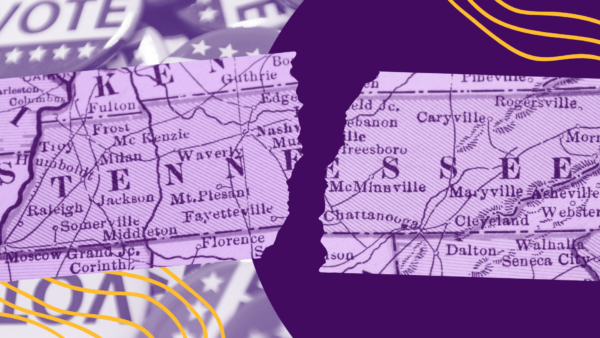NASHVILLE, Tenn. (Sept. 26, 2024) — A large coalition of Tennessee voting and civil rights advocates announced Thursday they will not refile litigation related to the alleged racially discriminatory gerrymandering of Congressional and state legislative districts in Tennessee.
“We made a difficult decision to forgo further litigation, but this is not a retreat by any means,” said President Gloria Sweet-Love of the Tennessee State Conference of the NAACP. “We know we will soon drive out the discrimination and racist practices that silence the voices of too many of us in Tennessee at the ballot box. That is why I urge every eligible voter in Tennessee to make a plan for how they will cast their ballot this November and every election so that our voices and our calls for a just democracy will be heard.”
The case was closed Wednesday by the U.S. District Court for the Middle District of Tennessee despite evidence detailing how Tennessee lawmakers created racially discriminatory voting maps by packing and cracking communities of Black voters in the Nashville and Memphis areas. The Legislature claimed in public hearings this was necessary to even out population sizes in the districts. But their litigation strategy revealed what was withheld from the public in those hearings — that the true goal was to create unfairly gerrymandered districts that benefit Republican candidates at the expense of Black voters.
Under new, substantial and unjust standards to prove racial gerrymandering outlined in the U.S. Supreme Court’s Alexander decision last May, the three-judge panel ultimately determined Aug. 21, that the case should not continue to trial. But the effect of these maps remains undeniable—communities of color that had built up political power over decades are now splintered in both Davidson and Shelby counties and unable to elect candidates of their choice.
“Tennesseans deserve the opportunity to elect representatives of their choice,” said Debby Gould, President of the League of Women Voters of Tennessee. “The League of Women Voters of Tennessee is disappointed that gerrymandered maps in Davidson and Shelby Counties have intentionally eroded the voices of communities of color. Despite this disappointing court ruling, our organization will vigorously continue with our efforts to ensure all voters have the opportunity to be heard and adequately represented.”
Despite the setback in this Tennessee litigation, the individual plaintiffs and plaintiff organizations are committed to standing up for the rights of Black Tennesseans and urge all Tennesseans to exercise their right to vote in the Nov. 5 election and all future elections.
“This isn’t just about lines on a map — it’s about having a voice in the decisions that shape our everyday lives,” said Ophelia Doe, an individual plaintiff in the lawsuit. “These gerrymandered maps strip us of the ability to elect leaders who will fight for the needs of our community, from education and childcare to housing, healthcare, and the environment. Without fair representation, we lose the power to influence the decisions that directly impact the future of our community.”
“If I never understood it before, I understand all too clearly that democracy is in chains,” said Dr. Judy Cummings, an individual plaintiff in the lawsuit. “The court’s ruling on the gerrymandered maps effectively restricted my vote in such a way that I will no longer be represented by a party that understands my community. As a Public Justice Theologian, I will continue to work for justice ensuring that all voices are represented!”
“As a Tennessean who has fought for decades for a state that is fair and equitable for all its citizens, I am beyond disappointed in this decision that would leave our most vulnerable communities divided and silenced,” said former Tennessee State Senator Brenda Gilmore. “The dismissal of this lawsuit does nothing to change the fact that Black voters and communities of color are having their voice silenced through manipulative redistricting right here in our state. The court may have closed this battle, but the fight for fair representation is far from over, and we will continue organizing, educating, and empowering our neighbors to make our voices heard at the ballot box.”
Only 45% of eligible voters in Tennessee cast a ballot in 2022, one of the lowest turnout rates in the nation, according to the U.S. Census, in part because of a lack of competitive elections to vote in as well as a suite of anti-voter practices that make it unnecessarily difficult for some to vote.
Groups are working to engage eligible voters to make sure they are aware of important election-related dates, including:
- October 7 is the final day for Tennessee residents to register to vote in order to cast a ballot in the Nov. 5 election.
- Early voting in Tennessee begins Oct. 16 and ends Oct. 31.
- Election Day is Tuesday, Nov. 5.
Background: The plaintiffs in the case — the Tennessee State Conference of the NAACP, the African American Clergy Collective of Tennessee, the Equity Alliance, the Memphis A. Philip Randolph Institute, the League of Women Voters of Tennessee and several individual Tennessee voters – filed a federal lawsuit in 2023 challenging portions of Tennessee’s congressional and state senate redistricting plans as intentionally discriminatory against Black voters and other voters of color under the 14th and 15th Amendments. The plaintiffs are represented by the Lawyers’ Committee for Civil Rights Under Law, Southern Coalition for Social Justice, pro bono counsel Winston & Strawn, and local counsel Sperling & Slater.
###
Southern Coalition for Social Justice, founded in 2007, partners with communities of color and economically disadvantaged communities in the South to defend and advance their political, social, and economic rights through the combination of legal advocacy, research, organizing, and communications. Learn more at southerncoalition.org and follow our work on Twitter, Facebook, and Instagram.

